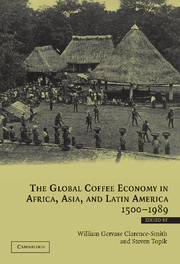Book contents
- Frontmatter
- Contents
- World coffee production
- Guatemala and Mexico
- Nicaragua and Costa Rica
- Brazil
- Cameroon
- Madagascar and Réunion
- East Africa
- Red Sea
- Ceylon and South India
- Java
- Introduction: Coffee and Global Development
- I ORIGINS OF THE WORLD COFFEE ECONOMY
- II PEASANTS: RACE, GENDER, AND PROPERTY
- III COFFEE, POLITICS, AND STATE BUILDING
- 11 Coffee and the Recolonization of Highland Chiapas, Mexico: Indian Communities and Plantation Labor, 1892–1912
- 12 Comparing Coffee Production in Cameroon and Tanganyika, c. 1900 to 1960s: Land, Labor, and Politics
- 13 Smaller Is Better: A Consensus of Peasants and Bureaucrats in Colonial Tanganyika
- 14 On Paths Not Taken: Commercial Capital and Coffee Production in Costa Rica
- 15 Coffee and Development of the Rio de Janeiro Economy, 1888–1920
- Conclusion: New Propositions and a Research Agenda
- Appendix: Historical Statistics of Coffee Production and Trade from 1700 to 1960
- Index
14 - On Paths Not Taken: Commercial Capital and Coffee Production in Costa Rica
Published online by Cambridge University Press: 01 September 2009
- Frontmatter
- Contents
- World coffee production
- Guatemala and Mexico
- Nicaragua and Costa Rica
- Brazil
- Cameroon
- Madagascar and Réunion
- East Africa
- Red Sea
- Ceylon and South India
- Java
- Introduction: Coffee and Global Development
- I ORIGINS OF THE WORLD COFFEE ECONOMY
- II PEASANTS: RACE, GENDER, AND PROPERTY
- III COFFEE, POLITICS, AND STATE BUILDING
- 11 Coffee and the Recolonization of Highland Chiapas, Mexico: Indian Communities and Plantation Labor, 1892–1912
- 12 Comparing Coffee Production in Cameroon and Tanganyika, c. 1900 to 1960s: Land, Labor, and Politics
- 13 Smaller Is Better: A Consensus of Peasants and Bureaucrats in Colonial Tanganyika
- 14 On Paths Not Taken: Commercial Capital and Coffee Production in Costa Rica
- 15 Coffee and Development of the Rio de Janeiro Economy, 1888–1920
- Conclusion: New Propositions and a Research Agenda
- Appendix: Historical Statistics of Coffee Production and Trade from 1700 to 1960
- Index
Summary
Much of the recent scholarship on the history of coffee in Central America has explored the distribution over time and space of small family-based cultivation, particularly in Costa Rica, Nicaragua, and El Salvador. Beyond the question of documenting the at times surprisingly wide distribution of these small-scale production units, researchers have also sought to understand the processes by which peasant or family farms were consolidated or fragmented over time and the reasons for such varied outcomes. From one extreme of dramatic impoverishment and dependence of the minifundista/semi-proletarian, to the other extreme of wealthier smallholders who employed their impoverished fellow villagers, these treatments of coffee's social history have tended to focus on a wide range of issues. Among these, commercial and financial relations between producers and merchant/processors and the always polemical topic of labor recruitment and coercion have been particularly relevant.
While no very broad agreement has yet been reached on a common nature of smallholding in Central America's coffee economy and its evolution over time, three general conclusions seem clear enough: first, some form of small holding survived, however impoverished and embattled, even in the more inhospitable contexts. While Williams no doubt provides the most copious evidence throughout the region, book-length works by McCreery for Guatemala and Lauria-Santiago for El Salvador and articles by Samper for El Salvador and by Charlip and Dore for Nicaragua have all made it clear that even in the cases long thought paradigmatic of estate-based coffee development, small holding has a complex and important history yet to be fully understood.
- Type
- Chapter
- Information
- Publisher: Cambridge University PressPrint publication year: 2003

